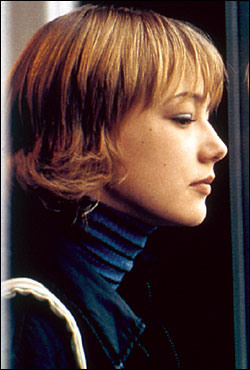FOR ALL ITS SERENE surfaces, the deeply engaging comic drama You Can Count on Me is one wild card. Do you love your sister? Your brother? Sure. Could you live with them again? Are you nuts? The delicate terrain between brothers and sisters has intrigued filmmakers from John Cassavetes to Barbra Streisand with a few stops in between. What sets Count‘s pair apart is the wit with which they’re written and the depth with which they’re played.
YOU CAN COUNT ON ME
written and directed by Kenneth Lonergan with Laura Linney, Mark Ruffalo, and Matthew Broderick opens November 17 at Harvard Exit and Metro
As the film opens, the death of their parents in a car crash shatters the orderly pattern of young Sammy and Terry Prescott’s lives. From this night on, big sister Sammy also becomes a mother to her brother, while Terry drifts into a kind of skepticism about permanence of any kind. By the time they’re adults, their roles seem to be set. Sammy (Laura Linney) now lives in the family’s old frame house in upstate New York, a haven for her and her eight-year-old son, Rudy (Rory Culkin). To the rootless Terry (Mark Ruffalo), Scottsville is stifling and narrow-minded, everything he disdains.
Writer-director Kenneth Lonergan sketches carefully. Sammy’s been a tenacious single mother for so long that the routine of her bank job doesn’t seem like living death, and sex without an iota of surprise is par for her life. Then, suddenly, there’s a fussy new manager at the bank (Matthew Broderick), determined to turn a friendly workplace toxic.
Meanwhile, Terry probably couldn’t say when the percentages turned against him or where his slide into full-time fuckup began. In Alaska, maybe. It’s certainly the case now in Wooster, Massachusetts, where his marginal life includes a newly pregnant girlfriend. Blessed with charm and a certain bruised beauty, Terry is quick and funny, self-protective as an armadillo and not what you’d call reliable. Yet, admirably and disastrously, he still tries.
WHEN TERRY TURNS up again in Scottsville after his longest absence ever, nothing about the Prescotts’ meeting goes smoothly, not even the way they’re dressed. Terry is skanky in what he calls his charity box “cuisine of garments.” Sammy is in her prim banker’s clothing—on a weekend!
Their expectations are even further apart. Terry just wants to borrow some money and head back to untangle the mess in Wooster. Sammy expects him to stay a while, maybe spend a little time with Rudy, who could use a man around—even his rough-edged uncle. So there are raw feelings on both sides when Terry’s life takes yet another ruinous turn and he lets Sammy persuade him to stay.
As Sammy, Terry, and Rudy share the house, Lonergan sticks close to reality. Can Sammy trust her son with Terry? Depends on your definition of trust. Terry would never put Rudy in harm’s way, but his truth-telling compulsion to let Rudy know about the boy’s worthless father is almost as damaging. On the other side, there’s a certain pool game that ends memorably for Rudy.
Lonergan (who also plays Father Ron) began in the theater, which may have encouraged his bent for tightly packed characters and surprising plot turns. Those qualities—rarer than they used to be in indie film—earned Count a screenwriting award and shared Grand Prize at Sundance. Lonergan also has a good ear for speech, from Terry’s circular stoner-logic to the smiling oppressiveness of Matthew Broderick’s bank manager.
Linney’s Sammy unfolds splendidly, but the discovery is Ruffalo. Are there star-making roles in movies anymore? Probably not, but there should be. Because as Terry moves toward a steadfastness he never before imagined, Ruffalo is incandescent.








